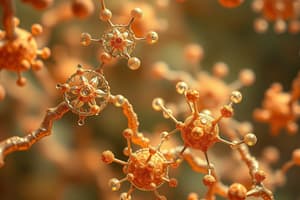Podcast
Questions and Answers
What are proteins, carbohydrates, lipids, and nucleic acids collectively referred to as?
What are proteins, carbohydrates, lipids, and nucleic acids collectively referred to as?
- Mineral bio-molecules
- Inorganic bio-molecules
- Organic bio-molecules (correct)
- Water bio-molecules
What is the major carbohydrate fuel?
What is the major carbohydrate fuel?
- Fructose
- Glucose (correct)
- Galactose
- Sucrose
Which carbohydrate reacts with glucose to form the disaccharide lactose?
Which carbohydrate reacts with glucose to form the disaccharide lactose?
- Sucrose
- Fructose
- Maltose
- Galactose (correct)
What is the ratio of carbon, hydrogen, and oxygen in carbohydrates?
What is the ratio of carbon, hydrogen, and oxygen in carbohydrates?
Which type of sugars are ketoses?
Which type of sugars are ketoses?
Carbohydrates are only found in living cells and not inorganic bio-molecules
Carbohydrates are only found in living cells and not inorganic bio-molecules
Monosaccharides are always reducing sugars
Monosaccharides are always reducing sugars
Glucose and fructose can combine to form the disaccharide sucrose
Glucose and fructose can combine to form the disaccharide sucrose
Starch and cellulose are both polysaccharides of glucose
Starch and cellulose are both polysaccharides of glucose
Pentoses and hexoses mainly exist in the linear form
Pentoses and hexoses mainly exist in the linear form
Carbohydrates are made up of carbon, hydrogen, and oxygen in the ratio 1:2:1.
Carbohydrates are made up of carbon, hydrogen, and oxygen in the ratio 1:2:1.
Monosaccharides are always reducing sugars.
Monosaccharides are always reducing sugars.
Pentoses and hexoses mainly exist in the cyclic form.
Pentoses and hexoses mainly exist in the cyclic form.
Galactose can easily be converted to glucose.
Galactose can easily be converted to glucose.
Fructose reacts with glucose to form the disaccharide sucrose.
Fructose reacts with glucose to form the disaccharide sucrose.
Flashcards are hidden until you start studying
Study Notes
Biological Macromolecules
- Proteins, carbohydrates, lipids, and nucleic acids are collectively known as macromolecules.
Major Carbohydrate Fuel
- Glucose is the primary carbohydrate fuel for cells.
Disaccharide Formation
- Galactose combines with glucose to form the disaccharide lactose.
- Fructose and glucose react to form the disaccharide sucrose.
Carbohydrate Composition
- Carbohydrates have a chemical composition represented by the ratio of carbon, hydrogen, and oxygen as 1:2:1.
Types of Sugars
- Ketoses are a type of sugar that contains a ketone group.
- Monosaccharides, including glucose and fructose, are always classified as reducing sugars.
Forms of Carbohydrates
- Pentoses (5-carbon sugars) and hexoses (6-carbon sugars) mainly exist in cyclic form in biological systems, though they can also take on linear forms.
Polysaccharides
- Both starch and cellulose are polysaccharides consisting of glucose units.
Conversion of Sugars
- Galactose can be easily converted into glucose through metabolic processes.
Studying That Suits You
Use AI to generate personalized quizzes and flashcards to suit your learning preferences.




